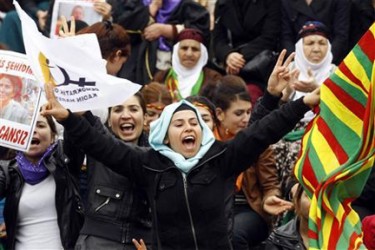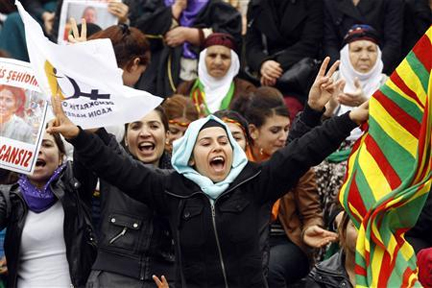BEIRUT (Reuters) – Syrian opposition leader Moaz Alkhatib urged Syrian President Bashar al-Assad’s government yesterday to start talks for its departure from power and save the country from greater ruin after almost two years of bloodshed.
Seeking to step up pressure on Assad to respond to his offer of talks – which dismayed some in his own opposition coalition, Alkhatib said he would be ready to meet the president’s deputy.
“I ask the regime to send Farouq al-Shara – if it accepts the idea – and we can sit with him,” he said, referring to Syria’s vice president who has implicitly distanced himself from Assad’s crackdown on mass unrest that became an armed revolt.

Speaking after meeting senior Russian, US and Iranian officials, Alkhatib said none of them had an answer to the 22-month-old crisis and Syrians must solve it themselves.
“The issue is now in the state’s court…to accept negotiations for departure, with fewer losses,” the Syrian National Coalition leader told Al Arabiya television.
The moderate Islamist preacher announced last week he was prepared to talk to Assad’s representatives. Although he set several conditions, the move broke a taboo on opposition contacts with Damascus and angered many in its ranks who insist on Assad’s departure as a precondition for negotiation.
Alkhatib said it was not “treachery” to seek dialogue to end a conflict in which more than 60,000 people have been killed, 700,000 have been driven from their country and millions more are homeless and hungry.
“The regime must take a clear stand (on dialogue) and we say we will extend our hand for the interest of people and to help the regime leave peacefully,” he said in separate comments to Al Jazeera television.
Assad announced last month what he said were plans for reconciliation talks to end the violence but – in a speech described by UN Syria envoy Lakhdar Brahimi as narrow and uncompromising – he said there would be no dialogue with people he called traitors or “puppets made by the West”.
Syria’s defence minister said the army had proved it would not be defeated in its confrontation with rebels but declined to say whether it would respond to an Israeli air strike last week.
Security sources said the Israelis bombed a convoy of arms destined for Assad’s ally Hezbollah, a sworn enemy of Israel, in neighbouring Lebanon. Syria said the attack struck vehicles and buildings at a military research centre near Lebanon’s border.

